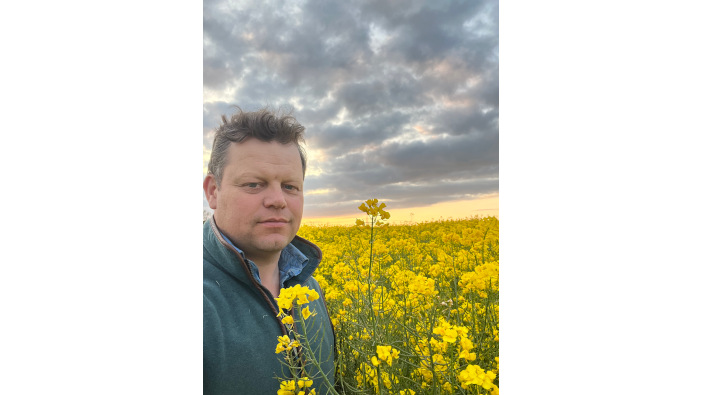Fraser Bush has changed the way he farms after he realised that bullying his soil with steel machinery was destroying his natural seedbed.
“The ‘boys ground’ of my farm had allowed me to move from ploughing to min-till, using a cultivator and a Horsch CO4 for our wheat and OSR, some years ago when our ‘master ploughman’ retired. I had continued to over winter plough for spring barley, peas and other spring crops, but had not taken the final step to direct drilling,” explained Mr Bush.
“In 2019 I was ploughing a field ready for spring barley, and I thought what I am doing? The ground is so easy to work, there is no need to spend hours on the tractor, using lots of diesel and disturbing the soil. I took the decision to start direct drilling with a Horsch Sprinter.”
In the autumn of 2019, after harvesting forage maize Mr Bush direct drilled wheat in one field with no cultivation whatsoever.
“Everyone thought I was mad and told me that I couldn’t do it, farmers are often reluctant to change, but we had a cracking crop of wheat which made me start thinking about direct drilling everything for harvest 2021,” continued Mr Bush.
He farms approximately 514 ha of grass and arable on the Badminton Estate in the South Cotswolds with his father and uncle. His two children in their late teens help wherever possible and their energy as well as young minds with modern views are invaluable.
Having moved to a more regenerative farming approach with min-till and cover crops, Mr Bush was already well on the road to carbon farming and the ability to generate a new revenue stream from the sale of carbon certificates.
“I was aware of soil carbon programmes such as AgreenaCarbon and it seemed perfect sense to join the right one and be financially rewarded for our already environmentally-friendly farming practices. I understood that direct drilling would increase the potential revenue from carbon certificates,” he said.
Before taking the decision to join Agreena, Mr Bush researched the carbon farming space by talking to neighbours, several agronomists, his fertiliser adviser, the NFU, read numerous articles and watched many YouTube videos.
He chose to work with Agreena and joined the AgreenaCarbon programme in time for harvest 2021.
“Agreena was one of the first soil carbon companies and had a high level of expertise and knowledge of the carbon farming marketplace,” he added. “I liked what it wanted us to do so that we could fully benefit from its programme. With a few tweaks we could do just about everything we needed to.”
Mr Bush had to enter field data into Agreena’s platform before the 2021 harvest. “From an admin perspective it’s a bit of a hassle,” he said. “Once the initial data is there it is a question of being disciplined around recording and keeping track of what you do in each field. My wife helps me with the administration side and the children get involved with data input. My biggest issue is making sure that my father records what he has done! The older generation farmed very differently but in these modern times we have to look at farming through fresh eyes to make it work financially.”
Entering data post-harvest to allow Agreena to calculate the carbon certificates per ha was easy for Mr Bush. He already uses a farm management system and had much of the necessary data to hand.
“At the end of the season I work through the numbers and pull everything together and then send a pretty large datasheet to Agreena. Any errors can be corrected,” he said.
He decided to sell his AgreenaCarbon 2021 harvest carbon certificates to Agreena resulting in an additional revenue of around £10Kfor that year.
A key Agreena differentiator is that it’s ‘farmers first’ approach means that farmers have complete control over what they want to do with their carbon certificates: keep hold of them, sell them within the voluntary carbon market (VCM), let Agreena sell them on their behalf, or sell them to Agreena.
Regenerative farming practices have improved the family’s farm soil health, increased biodiversity and importantly in today’s transitioning agricultural landscape to no BPS support, reduced input costs and provided an additional revenue from carbon farming.
Carbon certificates issued to Mr Bush following harvest 2022 will generate an income of EU36 per certificate.
When asked how he planned to use this revenue, he answered that it will help to keep the farm ‘alive’.
“The reduction in BPS payments, rising input costs, the potentially low yield and quality of grain as a result of the challenging harvest weather, all make for a depressing outlook,” he said. “We have to evolve and look at maximising our margins by farming with modern practices and accessing other revenue streams.”
“Some farmers will be looking at their figures and thinking Oh my God there is nothing left. There can’t be many farmers who would not welcome an additional revenue stream from carbon certificates.”
For Mr Bush, an important benefit of carbon farming is that it has freed up time to focus on other areas.
“Not spending hours working the ground is an obvious advantage. Apart from spending more time with the family, I also have a fencing business,” he added. “Fencing is often done on other farmers’ land which is a valuable opportunity to talk to them about their farming practices and learn from them; hopefully, they can learn from me. You cannot overestimate how much we learn from talking to other farmers.”
“Whenever I talk to farmers who are thinking about, or are already on the road to min-till or direct drilling, I tell them to look at carbon farming, the benefits it delivers and that they should waste no time in talking to Agreena to ensure they are signed up ready for harvest 2024. In my view, carbon farming is a no-brainer!” he concluded.


